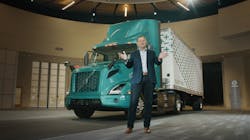Volvo finding fuel cell success in Arctic conditions
Volvo Trucks is taking its hydrogen fuel-cell testing to new heights.
The global truck OEM recently completed its first public road tests of the technology it is developing in a joint venture with Daimler Truck called cellcentric. Those tests were conducted with a Volvo FH tractor in Kiruna, Sweden, within the Arctic Circle, in a frigid climate, according to Volvo. The FH Electric is one of the OEM's European market EVs.
“It’s an electric truck. The big difference is rather than storing the energy onboard, you generate it,” Peter Voorhoeve, Volvo Trucks North America president, told FleetOwner during an interview earlier this month. “The principle of fuel cells is not so complicated, quite frankly. We still need to find solutions for hydrogen storage. But the fuel cell itself is a super good technology.”See also: 2023 alternative-fuel engine outlook
Several more OEMs and suppliers are developing hydrogen-powered fuel cells and fueling networks to decarbonize long-haul freight transportation, which is not yet conducive to battery-electric power on its own because of range and charging limitations.
“As we move to the zero-emissions freight future, in the long run, there are only two choices of power—battery electric and hydrogen fuel cell,” said Rick Mihelic of the North American Council for Freight Efficiency. The NACFE director of emerging technologies recently authored a report on hydrogen’s important role in trucking’s future.
The report, Hydrogen Trucks: Long Haul’s Future?, looks at using hydrogen power for long-haul freight routes. It covers fuel cell battery-electric and hydrogen internal combustion engines.
See also: What NACFE learned about hydrogen trucks
"As much as we appreciate battery-electric vehicles, they aren’t set up to go those really long distances with heavy loads,” Mihelic said in April. “So, right now, the only thing that’s on the plate for a zero-emission future in long-haul will be hydrogen-powered vehicles."
The hydrogen-powered trucks emit only water vapor as a chemical reaction charges a battery that powers the vehicle. This allows a smaller battery onboard than what powers current electric trucks on the market, such as VTNA’s Volvo VNR Electric Class 8 truck. Fuel-cell trucks would also be more suitable for long-haul applications than current heavy-duty EVs that require longer charging periods.
“Trucks are operating seven days a week and in all types of weather,” said Helena Alsiö, VP of powertrain product management at Volvo Trucks. “The harsh conditions on public roads in northern Sweden, with ice, wind, and lots of snow, make an ideal testing environment. I am pleased to say that the tests are going well, confirming tests we carried out beforehand, both digitally and on our confined test track close to Gothenburg.”
Volvo’s hydrogen fuel-cell trucks will use two fuel cells with a capacity to generate 300 kW of power. Green hydrogen is a potentially endless resource produced using renewable energy sources, such as wind, water, and sun.
The fuel-cell trucks will be available in the second half of this decade, Voorhoeve said. “It’s a little difficult to put a year on that—but it’s a very serious technology that will absolutely come true.”
See also: Canadian retail giant Loblaw to purchase Kenworth hydrogen trucks
Other OEM FCEV developments
Paccar announced during this spring's Advanced Clean Transportation Expo that it is on pace to be the first legacy truck OEM to begin serial production of its hydrogen fuel-cell electric tractor, which it has developed in partnership with Toyota Motor North America.
Initial customer deliveries are planned for 2024, with serial production scheduled for 2025. Dealers in the U.S. and Canada are accepting deposits for the first of these Kenworth T680 FCEV and Peterbilt 579 FCEV tractors.
See also: Accelera by Cummins' Davis stresses charging, refueling needs
Kenworth and Toyota Motor North America have collaborated on developing the T680 FCEV for years, including a 10-truck pilot program at the Port of Los Angeles. Paccar plans to integrate Toyota's latest heavy-duty hydrogen fuel-cell technology advancements into its flagship Kenworth and Peterbilt on-highway trucks. The FCEVs promise a range of up to 450 miles, depending upon driving conditions.
Along with partnering with Volvo Trucks on fuel cell development in Europe, Daimler Truck North America is working with Cummins here in the U.S. on a fuel-cell project for its Freightliner eCascadia tractor.
Zero-emission trucking startup Nikola also has a hydrogen fuel-cell vehicle, the Nikola Tre FCEV. The company is taking orders now for its Class 8 fuel-cell truck. It recently announced a large fleet purchase of 50 FCEVs and said deliveries could start before year's end.
About the Author
Josh Fisher
Editor-in-Chief
Editor-in-Chief Josh Fisher has been with FleetOwner since 2017. He covers everything from modern fleet management to operational efficiency, artificial intelligence, autonomous trucking, alternative fuels and powertrains, regulations, and emerging transportation technology. Based in Maryland, he writes the Lane Shift Ahead column about the changing North American transportation landscape.


